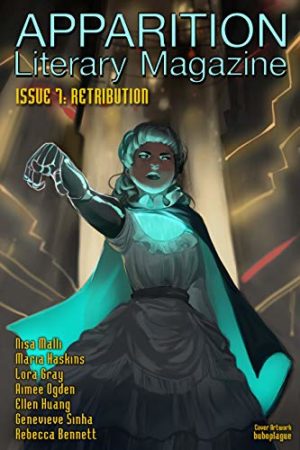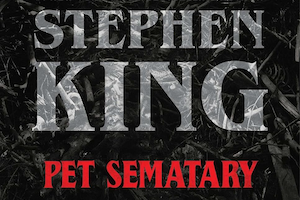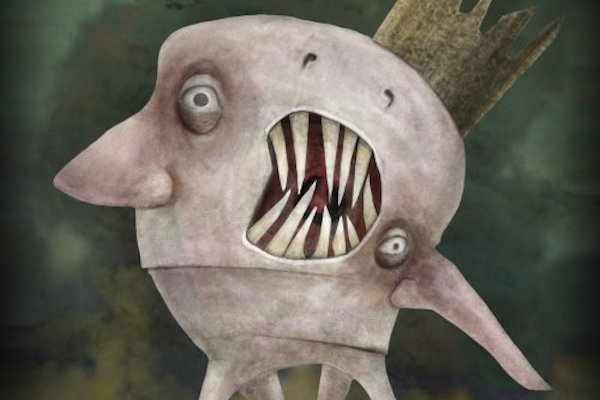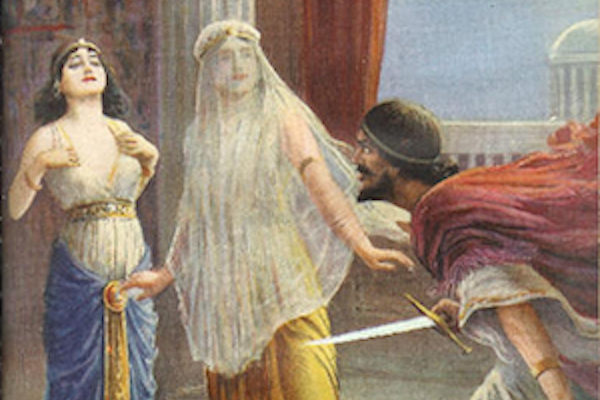Welcome back to Reading the Weird, in which we get girl cooties all over weird fiction, cosmic horror, and Lovecraftiana—from its historical roots through its most recent branches.
This week, we cover Aimee Ogden’s “His Heart is the Haunted House,” first published in Apparition Lit in July 2019. Spoilers ahead.
Karyn, dead too long, knows two types of ghosts. The dead who linger on this plane of their own accord are the ones who can act: break windows, slam doors, push people down stairs. The less lucky are kept on this plane by someone who won’t let them go. They cannot act, only be towed around by their living “keepers” and used to “abrade the old scars of… guilt and shame.”
Karyn’s “keeper” is a monster hunter who’s lived too long. He runs on pain pills and booze, as decrepit as his ancient truck. Other ghosts ride with him: Tish, Maria-Belen, Easterday, Dawb, Jaspreet, Mrs. Thelma Owens. The ghosts have two things in common: all female, and all monster victims the hunter failed to save. He keeps Karyn’s obituary in the dashbox of his truck along with the other women’s, but doesn’t think of her by name. She’s the cute redhead gnawed to death by a dogman.
Actually, the women have a third thing in common. They hate the hunter for stealing them from the sites of their former lives and dragging them in his wake. So what if he doesn’t realize he’s done this? In dreams they take turns tormenting him, venting their otherwise impotent rages. Only when the hunter finally dies can they be free. The ghosts have a pool going—Karyn’s bet is that a werewolf will off him. Though with his incessant travel, drinking, and vending-machine diet, Maria-Belen’s bet of a heart attack seems likelier.
The hunter drives to a town near Wichita to visit a fellow monster hunter. The ghosts sigh at this destination, nowhere near where they died and so without hope of a chance encounter with their own friends or families. The hunter’s friend lost a leg to the same poltergeist-haunted house that killed Easterday. So he’s not up to handling this new tip about werewolf in western Michigan. Will the monster hunter handle it?
Buy the Book
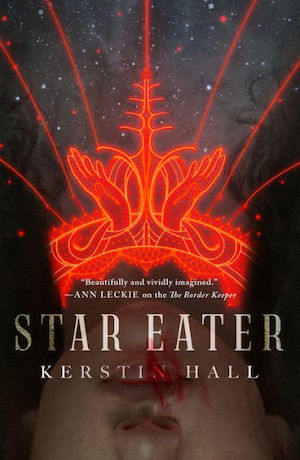

Star Eater
The monster hunter will. Karyn thrills to his destination. At that night’s rest stop, after the hunter drops into whiskey-assisted sleep, Karyn seeps into his skull. It’s not her turn, but the other ghosts don’t protest. They feel her need, now she’s so close to home.
Home is Greenhill, where Karyn meant to return after using her agricultural scholarship, to grow superior grapes and boost tourism. That dream’s lost, but she wants to know if her sister Rena ever married, had kids, bought a little house near the lake. Desperate, she struggles to make the hunter hear her desires over the script of his guilt over her death. But that script overwhelms her, leaving her only able to accuse: He should have done more to save her!
The hunter jerks awake to a bloody nose. The next morning, after stopping at an urgent care clinic, the hunter dials his friend, stops short of the last digit, drives on. Karyn hovers in the passenger seat as they near Greenhill, but fails to get the hunter to turn off.
That night, the hunter searches dense woods for the werewolf, accompanied by his ghosts. The monster leaps from ambush. The two grapple, the hunter goes down, the werewolf begins forcing the hunter’s own knife around toward his chest. In moments the hunter will die, releasing the ghosts into true death.
But—if Karyn passes into true death, she’ll never get to go home!
She drops into the hunter and lends him all her strength. It isn’t enough. Mrs. Thelma Owens joins her. Most of the other ghosts follow, and their combined strengths allow the hunter to free himself. As the werewolf lunges, Easterday slams in screaming. Together, the women power him into fierce counterattack, and it’s the werewolf who dies.
Still under the ghosts’ control, the hunter drives back to Greenhill. The Greenhill Family Diner still stands, twenty years after Karyn saw it last. Inside, the hunter’s greeted by a third kind of ghost, the still-living kind, Karyn’s sister Rena. Karyn-operated, the hunter tells Rena he knew her sister from agriculture school. Karyn would have been proud of how Rena’s kept up the diner.
Rena is visibly touched. She still thinks of Karyn every day, she says. As she goes to get the hunter’s order, Karyn sees the photos fixed to the counter. One’s of Rena and another woman, with two kids between them.
Later, in a hotel room, the ghosts use the hunter’s battered atlas to plan their next destination. Easterday insists on an intersection near Dayton, Ohio. Then the ghosts use the hunter to dial up his friend. They leap out, leaving him back in panicked charge of his body. He tells his friend something weird’s happening, like he’s losing control of himself. And yet, the losing control feels like the right thing to do. Is he going nuts?
Karyn doesn’t eavesdrop on the friend’s response. The hunter has lost enough of his privacy. When he hangs up, he weeps himself into dreamless sleep. The ghosts let him rest. Karyn runs fingers over his atlas, remembering how they feel to living—or shared-with-the-living—skin.
What’s Cyclopean: Karyn, haunting the hunter, “slices through him like an ax through spiderwebs.”
The Degenerate Dutch: All those deaths you didn’t prevent, they’re really about you, right? So many women, in so many fridges—why didn’t you save them?
Weirdbuilding: The hunter’s a familiar character, hunting familiar monsters (mostly canine).
Libronomicon: The monster hunter’s atlas starts as a way to find new battles, and ends as a way for the ghosts to retrace old ones.
Madness Takes Its Toll: Self-medication is not especially effective for hauntings—though it has let the hunter ignore his emotions more than is really healthy.
Ruthanna’s Commentary
Everyone loves a good ghost story. But even for the simplest campfire tale, the question comes up: why haunt? What makes the dead stick around, or the inanimate wake up and decide to mess with the living? For whatever walks Hill House, it’s some combination of loneliness and desire for control. For others it might be hunger, or closure, or pure vindictiveness. “Heart” leans into the need for explanation and taxonomization, telling us straight off that there are two types of ghost: the ones who choose to stay behind, who still get to act on the world, and the ones dragged into a hell of helpless passivity. And then we learn that it isn’t quite so simple.
The trope of fridging is far older than the term itself, and the hero haunted by his failures is an archetype recognizable at twenty paces, regardless of whether he wears a cowboy hat or a spacesuit. Or carries a kit of wooden stakes and silver bullets. Ogden makes the failure-haunting literal, women’s spirits pulled in the hunter’s wake by the force of his guilt-wallowing. The strong, silent type, after all, can’t be permitted any other emotion. (Not even feeling guilt over male victims. Fellas, would it be gay to obsessively catalog the men you didn’t save?) And—as the story eventually illustrates—if he moved from guilt to action, to actual atonement, that would get in the way of having more adventures.
But as Karyn struggles to communicate, when it’s her turn to vent frustration via nightmare, “the word you is the furthest thing from her mind.” Her death, the deaths of all the women forced into orbit around the hunter’s angst, they’re not about him. They’re about the people who never got to finish college or eat peanut butter M&Ms. They’re about the ones left behind, the mourners who know more than the colors of their hair or the spellings of their names.
For all the gory deaths and a hard-drinking grizzled fighter, this is a quiet story, and above all a respectful one. It offers respect for the lives lost around the edges of other stories, for un-dramatic motivations—not ghosts who want to walk halls forever or gain the forgiveness of those they’ve wronged, but ghosts who want to know if their sisters are happy. Ghosts who can cooperate, who can be kind and take turns, who can layer almost-helpless spirit over almost-helpless spirit until they can again act on the world.
And respect is universal here, even for the self-centered hunter—for the pressures and the expectations that have made him that way, because it’s all he thinks he’s allowed. The ghosts remember that he’s a person too, and use their newfound scraps of agency—just regained after years of being denied—to give him that moment with his friend, to let him admit that not only is he vulnerable, but that it feels right.
Whose story is it? The women’s stories are their own, and the hunter’s story is his own as well.
The other thing I appreciate here is the sense of place—specific midwest roads, a specific part of the country and a specific sort of person who lives here. (But not only that sort—the hunter is very clearly a beer-and-bullets sort of guy, but the ghosts he tows around come from every background that might run afoul of a dogman.) It’s particularly impressive for a story that isn’t about haunts tied to a particular house or town. And it’s an interesting contrast with Hill House, which is very strongly a Place, but not one situated in any real-world location—you could fit it just about anywhere that isn’t pancake-flat. Which is appropriate for a Place that isolates, that does its best to separate you from the real world.
The hunter, on the other hand, left to his own devices, will take his ghosts anywhere but home. The world’s right there… if only they could touch it. And so, finally, they do. A happier ending, I suspect, than we’re likely to get next week.
Anne’s Commentary
My mind being the cluttered lumberyard it is, the title of Ogden’s story triggered an avalanche of weathered two-by-fours to uncover another evocative title: Carson McCullers’ The Heart is a Lonely Hunter. McCullers’ inspiration was a line from Scottish poet William Sharp: “But my heart is a lonely hunter that hunts on a lonely hill.” And that brings us back in a fullish circle to Ogden’s lonely hunter. Like the family Winchester and the evergreen Van Helsing clan, he stalks the biggest game of all: monsters.
(My good friend Carl Kolchak reminds me that some monster hunters employ grainy photography and pocket recorders rather than guns and knives, but today’s hunter goes straight for his well-honed Woodman’s Pal.)
(Speaking of which Pal, Google shows a combination machete-ax-all’round wilderness survival tool with a wicked terminal talon. I’m not sure how this would function as a stabbing blade, but certainly the Woodman’s Pal would make an impressive monster-hunting weapon, especially for decapitating werewolves.)
(I presume the Woodman’s Pal could also do a number on dogmen. Apparently dogman isn’t a mere synonym for werewolf, but refers to a cryptid specific to Karyn’s home state of Michigan. Carl agrees that this biped sports a human torso and a canine head, stands sevenish feet tall, and has a howl like a human scream. Karyn was truly unlucky to meet one.)
(Enough parenthetical digressions, if such they are and not just fullish circling into the meat of this excellent story. Stories that invite fullish circling are good things, I think.)
Ogden’s monster hunter goes unnamed by his ghostly entourage. That seems fair since the hunter doesn’t always name “the ones we lost,” as he and his fellow monster hunter call the ghosts. He knows their names, though, having studied their obituaries until the newsprint is well-stained with booze. Referring to Mrs. Thelma Owens as that old black lady we found behind the church and Karyn as that cute redhead is perhaps a way to dodge the guilt that’s tied them to the hunter.
That ghosts come in (at least) two major flavors is a great concept. Ogden’s more “traditional” ghost chooses haunting a place over “true death.” It has agency, often used for destructive purposes—poltergeists belong to this ghost-genus.
The second genus of ghost, to which Karyn and friends belong, are unwilling sojourners between life and true death. They exist in limbo, both in the general sense of “an intermediate state attended by uncertainty” and in the Christian sense of “an abode for the souls of unbaptized infants and those of the just who died before Christ’s coming”—that is, an abode for the innocent dead. They’re all victims for whose deaths the hunter accepts blame. Curiously, he doesn’t accept blame for the deaths of male monster-victims. He doesn’t need them as he needs the females.
How should we reckon his need? Does he see himself as a knight errant, chivalrous protector of womankind? Is homophobia involved—Karyn observes how he shakes his friend’s hand over the barrier of a cooler, as if “he needs distance from something as truly deadly as giving the old man a hug.” Or is the hunter of predators himself a predator?
I think that in the hunter’s mind, he’s more knight than anything else. Nevertheless, the relationship between him and his ghosts is abusive. The ghosts are hostages to his compulsion to self-flagellate. Poignantly, the one action they can take must worsen their situation—by tormenting the hunter in dreams, they intensify his guilt and thus his grip on them.
The ghosts believe his death is their only escape, thus their wagers on how he’ll succumb. Karyn votes for werewolf attack—let the hunter die as gorily as she did. The irony: When a werewolf does attack, Karyn leaps to the hunter’s aid. Her epiphany: It’s not only the hunter’s guilt that keeps her in limbo, it’s her own need for closure, for a last contact with her sister. The hunter’s her sole link to the living. Alone, though, she’s too weak to influence him.
As Ogden writes, “Driving is an exercise in teamwork.” Only united, all squeezing into his body simultaneously, can the ghosts make the hunter their puppet and mouthpiece. Kill the werewolf. Take Karen to her sister. Help the other ghosts settle their earthly affairs.
The hunter rendered Locutus of Borg might have been the story’s end—the ghosts get revenge! However, that’s not the end Ogden deftly works toward. Her hunter’s no necromantic villain, like Joseph Curwen or Herbert West. He’s blundered and injured. He’s taken the wrong path to expiate his guilt. But he’s teachable. He can become a team-player, ceding control to the ghosts because it feels like the right thing to do. Big step for a monster-hunting tough.
We don’t know what the hunter’s friend says to him over the phone, but the exchange leaves him sobbing as if his heart has been broken. Or not broken. Unlocked, let’s say, rendering all the doors and windows of the haunted house openable at last. The ghosts can leave at will.
Or stay a spell if they prefer—instead of prisoners, guests.
Next week, the final chapter of The Haunting of Hill House!
Ruthanna Emrys is the author of the Innsmouth Legacy series, including Winter Tide and Deep Roots. Her short story collection, Imperfect Commentaries, is available from Lethe Press. You can find some of her fiction, weird and otherwise, on Tor.com, most recently “The Word of Flesh and Soul.” Ruthanna is online on Twitter and Patreon, and offline in a mysterious manor house with her large, chaotic household—mostly mammalian—outside Washington DC.
Anne M. Pillsworth’s short story “The Madonna of the Abattoir” appears on Tor.com. Her young adult Mythos novel, Summoned, is available from Tor Teen along with sequel Fathomless. She lives in Edgewood, a Victorian trolley car suburb of Providence, Rhode Island, uncomfortably near Joseph Curwen’s underground laboratory.










